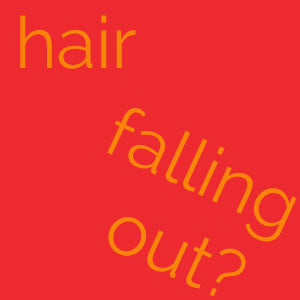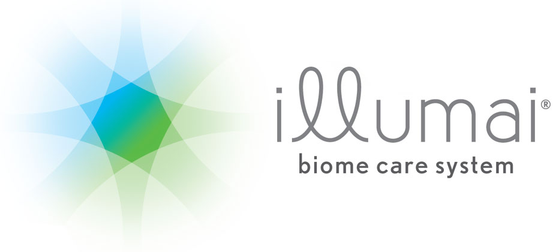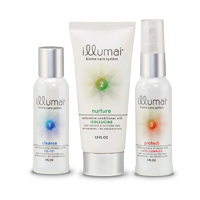Pregnancy Hair and Postpartum Hair Loss: What is Happening??
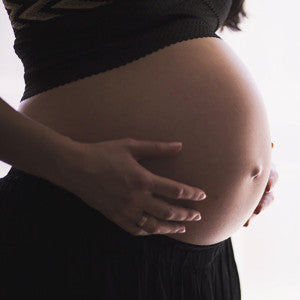
If you’re pregnant or had a baby recently, you may have noticed that your hair has been acting out of character. What’s going on? From newfound thickness to excess hair in the drain, your hair (like you!) goes through significant changes during pregnancy and the postpartum period. Let’s break down just what happens to your hair, how to care for it and what to avoid.
Hair Changes During Pregnancy
While pregnant, a mom-to-be undergoes many miraculous changes – all set in motion by your hormones. Normally, your hair grows in three stages: a growing stage (called the anagen phase), a resting stage (the telogen phase) and a shedding stage (the exogen phase). Typically, you shed about 100 hairs a day. When you’re pregnant, those hormones can pause the exogen phase, leaving most of your hair in the growing or resting stage. This is why many women notice thicker, lusher hair while pregnant – enjoy it! Fuller hair is a nice perk amidst morning sickness and other changes the body goes through… and it won’t last.
Alternately, for some women, the opposite is true – hair becomes dry or brittle, gets oily faster, and even texture changes can occur – from voluminous to limp, straight to curly. Hormones are often to blame, but dry and brittle hair can also be a sign of a nutrient deficiency common in pregnancy. Be sure to eat nutritiously, speak to your health practitioner and stay calm. For most women, hair returns to normal after their baby is born.
Postpartum Hair Loss – it’s not caused by breastfeeding.
In the postpartum stage, your hormones begin to level off. Your hair cycle follows suit and returns to its regular growth schedule. As it rebalances, the increased number of hairs in the growing or resting phase move into the shedding phase. It can appear that you are losing a worrisome amount of hair. Some new mother’s associate this hair loss with breastfeeding – but the same process happens to mothers who bottle feed. (Remember, breastfeeding is crucial to establishing and seeding your baby’s microbiome – don’t let a short-term situation discourage you!) Excess hair loss is temporary for both breast and bottle feeders; it’s simply a part of your body returning to normal.
Keep Your Hair Healthy – For You and For Your Baby.
Whether you are in pregnancy or postpartum, how you care for both your hair and scalp can improve both how your hair looks, as well as your overall health and the health of your baby. Here’s some great tips:
Balance your biome! No matter what your hair type or issue, your body loves balance. Look for hair care that holistically manages your biome and symptoms like dryness, damage, excess oil and frizz will resolve themselves.
Avoid toxic chemicals. Unfortunately in the U.S., cosmetic ingredients are not yet regulated. That means that a lot of products can and do use a host of toxic ingredients. We are only beginning to learn their long-term repercussions – so err on the side of caution! Try to avoid the following:
- Sulfates & Silicones: Sulfates remove the necessary protective layer of lipids and anti-microbial peptides that your biome creates. This leaves the hair prone to dryness and damage. More importantly, it leaves your skin open to absorbing other chemicals and changes the environment of your microbiome (which you pass to your newborn). Silicones coat the skin and prevent your microbiome from thriving.
- Parabens: Parabens are group of chemicals used as preservatives in cosmetic and personal care products, including hair care. When applied topically, our bodies absorb them through the skin. Parabens pose a health threat because they chemically resemble the female hormone estrogen. Certain cancers, such as melanoma and breast cancer, are stimulated by estrogen. During pregnancy, a woman’s body carefully regulates the levels of estrogen to support the optimal growth and development of the fetus. Introducing estrogen-like compounds from parabens absorbed through skin into the mother's circulation complicates normal hormonal regulation for a mother and her developing baby. Meanwhile, male fertility can be reduced by estrogens. While everyone should be mindful of parabens, pregnant and postpartum women should especially avoid them so as not to pass them on to baby internally, through contact or through breast milk.
Eat nutritiously! Foods that are particularly good for your hair include yogurt, fresh fruit and vegetables, salmon and flax seeds, cold pressed oils, whole grains and almonds, figs, and dates.
Don’t cut your hair too short – not yet anyway. Your hair may continue to change (and your face shape may change too). What seems like a good idea today could be a regret tomorrow. Stick with regular trims to keep it healthy.
Give yourself a scalp massage. Better yet, have someone do it for you! Not only will it feel wonderful, it will promote healthy circulation to your scalp.
Remember, no matter what is happening with your hair, your body is accomplishing something extraordinary ‒ and there’s nothing more beautiful than a healthy mom and baby.
Learn More . . .

Detox Your Locks!
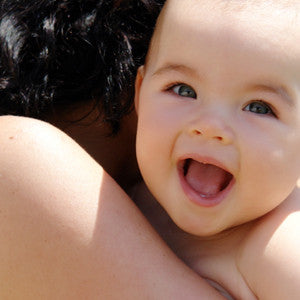
New Mamas: Nurturing Your Baby With a Healthy Microbiome
